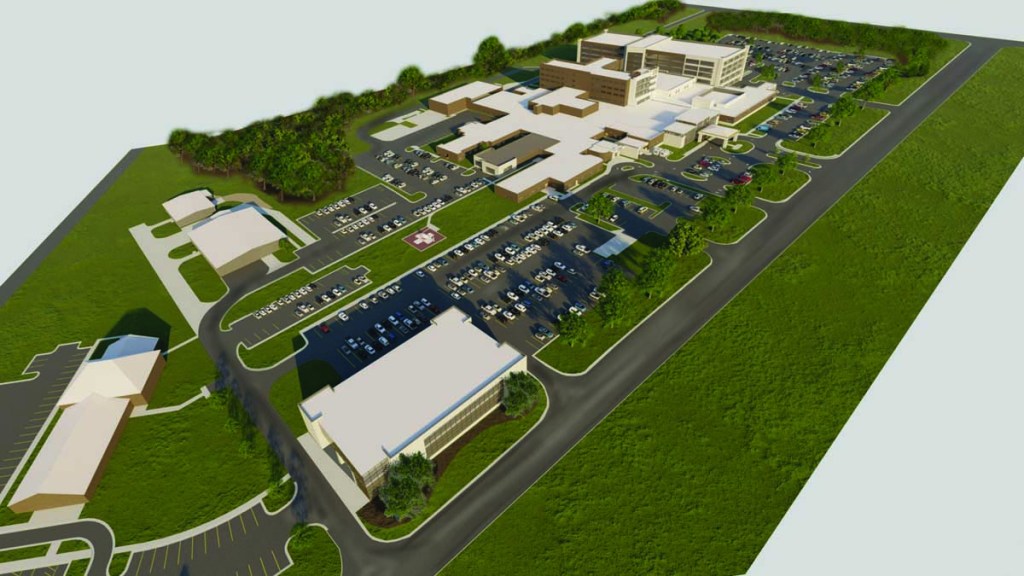Hospital’s plan calls for radiation oncology unit by end of 2020
Published 2:02 pm Friday, November 1, 2019

- This rendering from Colquitt Regional Medical Center's strategic plan shows what the Moultrie hospital is expected to look like once all the proposals in the plan take place, somewhere around 2040. The gray-roofed building in the center is a linear accelerator for a radiologic oncology program; construction is expected to start this coming February with an opening the following fall. In the immediate foreground is an education center that is expected to open in 2021. The top of the image shows the addition of a new patient tower, which is planned for 15-20 years from now.
MOULTRIE, Ga. — Colquitt Regional Medical Center recently unveiled its strategic plan spanning more than 20 years down the line.
The hospital’s C.E.O., Jim Matney, detailed the plan to the Moultrie City Council on Oct. 1 and the Colquitt County Board of Commissioners on Oct. 22.
“This is my way of keeping everybody informed, and kind of also get feedback if we’re doing the wrong things up there,” he said.
Filing under four tenets, CRMC will achieve recognition for quality care, be recognized nationally for compassionate care, expand the regional medical center concept and become a premier academic medical center.
A part of this larger mission is consolidating all medical fields under itself.
Matney said he wants to make sure the hospital can give 100 percent of a patient’s care in-town.
“We had 224 patients last year that had to go either to Thomasville or Albany to get radiation therapy,” he said as an example. “We think that’s part of our job to serve those needs.”
He also said this should help draw in patients turned away from other medical institutions, since CRMC doesn’t refuse care for a lack of finances.
The first effort under this will bring in radiation oncology. It was approved earlier this year and bids for its construction will begin towards February 2020.
Matney said this is an important step because patients receiving radiation oncology go through it five times a week for six weeks, oftentimes with nausea afterwards.
“And if I told you for the next six weeks you had to (if you lived here) drive to Valdosta, would you have transportation?” he asked. “You can’t drive after [it], you’re puking out your brains, who would you get to take you for six weeks? Who could take off work?”
Even if the patient were married for instance, their spouse would have to take off work to take them, essentially losing two household incomes for six weeks. That’s the biggest reason to have it here, Matney said.
“We provide medical transportation already and if they lived here then we could bring them back and forth,” he said.
According to its construction/equipment budget, radiation oncology’s inception will cost around $7.6 million ($2.8 million for equipment and $4.8 million for construction; this is subject to change).
Matney said he expects a fall 2020 opening date (which includes the installation of a linear accelerator) and a volume of 125 patients for the first year, 151 by its fifth.
This also functions as a brand marketing strategy, a connecting branch in the overarching umbrella of CRMC’s offerings, like the Mayo Clinic.
“If people could say they’re going over to the Colquitt Regional Medical Center, it could be any place,” Matney said. “As long as your brand is strong, it kind of creates a one brand for everything.”
Geriatric psychology — geropsych — will come next. It’s currently waiting for approval and is expected to be $2.8 million for first-year operational costs. An expected opening date is spring 2021.
In taking the aforementioned tenets more seriously in the past, CRMC gained a $750,000 federal grant, announced in August, and a $50,000 Georgia Heart grant, announced Oct. 1, for an upcoming psychiatry program.
Matney said this program is a solution one of the most underserved issues in the market and “probably” in the region.
“Our ER stays loaded with psychiatric patients [and] we don’t have enough psychiatrists in town,” he said. “Our jails are loaded with psychiatric patients and we think that it’s going to work to serve a real need in our community.”
Matney said he’s planning to go to Georgia legislators to ask for matching funds on the federal grant. According to him, the psychiatrist training program will begin within the next two years.
The plan is to have and graduate three residencies a year.
“Think about what that does for Colquitt County,” Matney said. “Three psychiatrists could serve the needs in Colquitt County, but our hope is to place these psychiatrists strategically around South Georgia so that we could meet that need.”
The strategic plan calls for new plumbing, HVAC and bathrooms throughout the existing patient tower by 2020’s end.
A regional education center is also in the works with an expected 2021 opening. The estimated $7 million project already has a promised $2 million backing from Ameris Bank.
“That’s really going to provide opportunities for nurses, EMTs, lab tech folks and RNs to experience training in a simulated area,” Matney said.
The project may begin construction in 2020 or 2021.
CRMC will also be designated as a level four trauma center, Matney said, though it hasn’t yet. Injured from vehicle wrecks and other such accidents would receive trauma care in-town instead of being life-flighted and handed a larger bill.
Other future projects include renovations to the laboratory, visitor lobby, cafeteria, and maternal infant unit; a power plant replacement; and the addition of telemedicine, a central security monitoring system and cardiac pulmonary rehabilitation.
Parking expansion will begin in spring 2020 and a new patient tower is also scheduled to be built 15-20 years down the line, potentially 2040, Matney said.
Along the way, the hospital will continue to strive toward its goal.
“We’re going to continue to focus on giving compassionate care; we’re going to hold our people accountable; we’re going to respect each other; and then we’re always going to strive for excellence,” Matney said.





